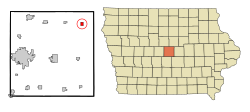Demographics
2020 Census
As of the 2020 Census, [7] there was a total population of 528 people. There was a population density of 704 people per square mile, spread over 0.75 miles. Of those 528 people, the median age was 36.9 years, with 19.7% of the town's population under the age of 18, 60.2% between the ages of 18 and 64, and 20.1% of the population over the age of 65. There were a total of 231 households, with an average of 2.81 people per household.
57% of the town's population is male, with 43% of the population female. The racial makeup of the town was 93.75% White, less than 0.5% African American, 4.2% mixed race, and 1.51% Hispanic.
The average income per capita of Zearing was $24,001, which is lower than the state average, and the median household income was $54,861, 90% of the average for the rest of the state. 17% of the town lives under the poverty line, which is far higher than the rest of the state which has an average of 11%.
61% of the population of the town is identified as currently married, with 11.7% of women between the ages of 15 and 50 gave birth during that year, almost double the state average. [8]
92.5% of the Zearing population has received a high school degree, which is the same as the Iowa state average. Although Zearing has a lower-than-average percentage of the population having received college degrees, only 28.4% of the town's population has received a college degree compared to the state average of 30.5%.
6.2% of the town's population were veterans.
2010 Census
As of the census [9] of 2010, there were 554 people, 219 households, and 146 families living in the city. The population density was 738.7 inhabitants per square mile (285.2/km2). There were 245 housing units at an average density of 326.7 per square mile (126.1/km2). The racial makeup of the city was 99.6% White, 0.2% African American, and 0.2% from two or more races.
There were 219 households, of which 34.2% had children under the age of 18 living with them, 52.1% were married couples living together, 8.2% had a female householder with no husband present, 6.4% had a male householder with no wife present, and 33.3% were non-families. 31.1% of all households were made up of individuals, and 14.6% had someone living alone who was 65 years of age or older. The average household size was 2.40 and the average family size was 2.98.
The median age in the city was 39 years. 25.8% of residents were under the age of 18; 7% were between the ages of 18 and 24; 24.6% were from 25 to 44; 22.4% were from 45 to 64; and 20.2% were 65 years of age or older. The gender makeup of the city was 50.0% male and 50.0% female.
2000 Census
As of the census [10] of 2000, there were 617 people, 229 households, and 158 families living in the city. The population density was 828.4 inhabitants per square mile (319.8/km2). There were 249 housing units at an average density of 334.3 per square mile (129.1/km2). The racial makeup of the city was 97.57% White, 0.16% African American, 0.81% Native American, 0.65% Asian, 0.16% from other races, and 0.65% from two or more races. Hispanic or Latino of any race were 0.65% of the population.
There were 229 households, out of which 35.8% had children under the age of 18 living with them, 59.0% were married couples living together, 6.6% had a female householder with no husband present, and 30.6% were non-families. 28.8% of all households were made up of individuals, and 12.7% had someone living alone who was 65 years of age or older. The average household size was 2.55 and the average family size was 3.13.
26.6% are under the age of 18, 7.9% from 18 to 24, 26.4% from 25 to 44, 19.3% from 45 to 64, and 19.8% who were 65 years of age or older. The median age was 38 years. For every 100 females, there were 86.4 males. For every 100 females age 18 and over, there were 84.9 males.
The median income for a household in the city was $37,614, and the median income for a family was $45,156. Males had a median income of $30,398 versus $21,250 for females. The per capita income for the city was $14,615. None of the families and 3.2% of the population were living below the poverty line, including no under eighteens and 1.6% of those over 64.
This page is based on this
Wikipedia article Text is available under the
CC BY-SA 4.0 license; additional terms may apply.
Images, videos and audio are available under their respective licenses.

